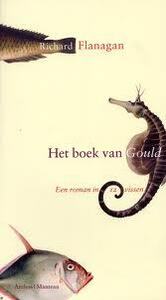Take a photo of a barcode or cover
I really enjoyed this. A couple suggestions for future readers:
1. Just power through the first chapter. It is really just a prologue and only serves to set up the idea that the following story may or may not be true. Aside from that, it is largely pointless.
2. You may not want to read it while eating. It is about a convict living in a prison settlement on a island off of Tasmania. The narrator can be quite graphic about the living conditions. But, he is also pretty funny.
One thing you may not realize while reading the book is that, while it is fiction, Sarah Island really was a convict settlement in the early 1800s and William Buelow Gould really was a convict that painted pictures of fish.
1. Just power through the first chapter. It is really just a prologue and only serves to set up the idea that the following story may or may not be true. Aside from that, it is largely pointless.
2. You may not want to read it while eating. It is about a convict living in a prison settlement on a island off of Tasmania. The narrator can be quite graphic about the living conditions. But, he is also pretty funny.
One thing you may not realize while reading the book is that, while it is fiction, Sarah Island really was a convict settlement in the early 1800s and William Buelow Gould really was a convict that painted pictures of fish.
challenging
dark
tense
slow-paced
Plot or Character Driven:
Character
Strong character development:
Complicated
Loveable characters:
No
Diverse cast of characters:
Yes
Flaws of characters a main focus:
Yes
Oh, this is just wonderful. It's about a Tasmanian prison colony, but it's also about identity, love, and fish...
adventurous
dark
funny
reflective
medium-paced
Plot or Character Driven:
A mix
Strong character development:
Complicated
Loveable characters:
Complicated
Diverse cast of characters:
Yes
Flaws of characters a main focus:
No
challenging
reflective
slow-paced
**SPOILERS AHEAD**
This is the second book in the past month (following Colson Whitehead's The Intuitionist) where I've felt like the illustrious critics writing the glowing reviews that grace the jacket are like traders playing the futures market. There's no denying that Flanagan has great talent, but I'm not sure that Gould's Book of Fish is the masterpiece so many of the blurbs paint it to be, and it's certainly not (as one of them put it) "a partial answer to the question of the relative value of human existence."
There is lots of imagination at work in the Book of Fish. The reconstruction of the colonization of Tasmania is fevered and vivid if a bit myopic at times (Sarah Island often seemed as if it were the size of someone's backyard, and the overall claustrophobic nature of the book, while probably intended to a degree, was a bit too much for me).
The book's book about a book that's a reconstruction of a book that's a reconstruction of a book hook felt a bit familiar--kind of postmodern old hat at this point (the ghosts of House of Leaves, most of Eco's work, and Borges' "Pierre Menard," and even Delany's Dhalgren hang heavy). This book feels like it very much wants to be about narrative structure, but loses that thread for much of the middle before picking it up again in the Crayfish chapter when Gould discovers that the registers he'd kidnapped from the penitentiary office are in fact the manuscript that he himself is living. The afterword, which reveals Fight Club-style that Gould has himself been all of the characters he's described, wants desperately to be clever, but it really adds nothing to the content of the book. It should be suckerpunch but it just produces a bemused "...huh."
What I got from The Book of Fish, what I take to be its central meaning, is that all history is invented. The main character (both Gould and Hammett) is a forger. The book is an elaborate recreation of nothing that ever happened. The multiplicity of personalities are really all products of the mind of the (invisible) writer. This revelation alone is not worth the 400+ pages it took to deliver. The mediations on racism, self-delusion, and the general savagery of human existence take up the bulk of the novel but are really just the (occasionally relevant) padding around the existential framing questions.
I think Flanagan has it in him to write a Great Novel, but I don't think Book of Fish is it. It has great moments, great descriptions, some amusing or horrifying set-pieces, and a mostly good sense of place, but it feels like a dress-rehearsal for something truly significant. Too many of Flanagan's attempts at philosophical thought ring hollow or fall short of the meaning they're grasping for. Too many fragments go nowhere. I enjoyed reading it and will certainly look for other books by him, but I felt let down at the end.
This is the second book in the past month (following Colson Whitehead's The Intuitionist) where I've felt like the illustrious critics writing the glowing reviews that grace the jacket are like traders playing the futures market. There's no denying that Flanagan has great talent, but I'm not sure that Gould's Book of Fish is the masterpiece so many of the blurbs paint it to be, and it's certainly not (as one of them put it) "a partial answer to the question of the relative value of human existence."
There is lots of imagination at work in the Book of Fish. The reconstruction of the colonization of Tasmania is fevered and vivid if a bit myopic at times (Sarah Island often seemed as if it were the size of someone's backyard, and the overall claustrophobic nature of the book, while probably intended to a degree, was a bit too much for me).
The book's book about a book that's a reconstruction of a book that's a reconstruction of a book hook felt a bit familiar--kind of postmodern old hat at this point (the ghosts of House of Leaves, most of Eco's work, and Borges' "Pierre Menard," and even Delany's Dhalgren hang heavy). This book feels like it very much wants to be about narrative structure, but loses that thread for much of the middle before picking it up again in the Crayfish chapter when Gould discovers that the registers he'd kidnapped from the penitentiary office are in fact the manuscript that he himself is living. The afterword, which reveals Fight Club-style that Gould has himself been all of the characters he's described, wants desperately to be clever, but it really adds nothing to the content of the book. It should be suckerpunch but it just produces a bemused "...huh."
What I got from The Book of Fish, what I take to be its central meaning, is that all history is invented. The main character (both Gould and Hammett) is a forger. The book is an elaborate recreation of nothing that ever happened. The multiplicity of personalities are really all products of the mind of the (invisible) writer. This revelation alone is not worth the 400+ pages it took to deliver. The mediations on racism, self-delusion, and the general savagery of human existence take up the bulk of the novel but are really just the (occasionally relevant) padding around the existential framing questions.
I think Flanagan has it in him to write a Great Novel, but I don't think Book of Fish is it. It has great moments, great descriptions, some amusing or horrifying set-pieces, and a mostly good sense of place, but it feels like a dress-rehearsal for something truly significant. Too many of Flanagan's attempts at philosophical thought ring hollow or fall short of the meaning they're grasping for. Too many fragments go nowhere. I enjoyed reading it and will certainly look for other books by him, but I felt let down at the end.
This is very good and really easy to read through without the loss of beautiful language. The beginning and end were my favourite and while some bits in the middle were a little off for me, they were intended to make me feel uncomfortable so mission accomplished! It is also a excellent account of the race in Natural Science and between said scientists.
Unfortunately I got a bit lost in this book. It is the first one of Richard Flanagan's that I have read, I will be reading some more of his as I wasn't put off by it.
Great descriptions of real and imagined life in the harsh penal colony of Sarah Island in Tasmania. I have visited this place - the life of the convicts seems unable to be lived on today's standards.
Great descriptions of real and imagined life in the harsh penal colony of Sarah Island in Tasmania. I have visited this place - the life of the convicts seems unable to be lived on today's standards.
This is so dark yet the voice of Gould had me chuckling out loud, the mouth on him is written superbly, I'd have liked to meet him except I wouldn't want to be there.





